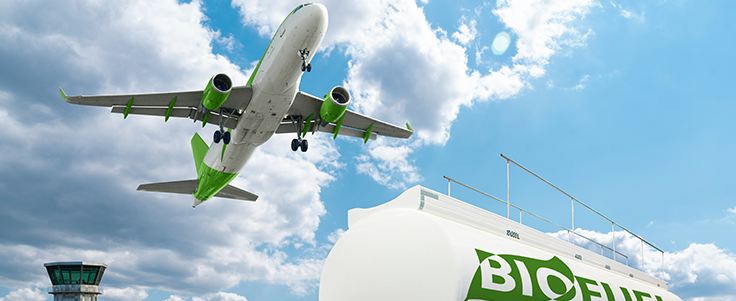Sustainable Aviation Fuels (SAF) will represent up to 65% of aviation’s net zero efforts.
They can be produced from multiple feedstocks, including waste oil and fats, green and municipal waste, and non-food crops, and will reduce CO2 emissions by up to 80%. Already, nine biofuel production pathways are certified to produce SAF, which, by design, are drop-in solutions.
Governments and regulatory bodies are already beginning to insist on their use. In October 2023, the European Union adopted ReFuelEU, which requires a minimum of 2% SAF supply in 2025, rising to 70% in 2050. A month later, the ICAO CAAF/3 called for international aviation to be 5% less carbon intensive by 2030.
But the problem is that the global SAF market is still in its infancy with varied capacity across the regions and overall production lagging requirements. In 2023, global SAF production doubled to more than 0.5 million tonnes ( 625 million liters), but this was still just 0.2% of global jet fuel use. Although production is expected to triple to 1.5 million tonnes ( 1.875 billion liters) in 2024, 500 million tonnes ( 625 billion liters) will be needed by 2050.
Moreover, there is little consistency in the way SAF is accounted for and tracked. There are different mechanisms and methodologies that inevitably have an impact on credibility.
SAF Registry
To further a transparent, dynamic, global market in SAF, IATA is creating the SAF Registry. The aim is to authoritatively account for and report emissions reductions from SAF and, in so doing, accelerate SAF uptake.
“This is a flagship initiative because SAF is so important to net zero,” says Michael Schneider, IATA’s Assistant Director, Sustainability Programs. “SAF is not available everywhere. We need to help create a global supply and make SAF available where it is not available. And we need to make sure its environmental attributes are verified, tracked, and reported accurately.”
The SAF Registry builds on the Book and Claim concept and stands out in several ways. One of the program’s unique features is the participation of governments. This will assist airlines’ regulatory reporting obligations, such as for the Carbon Offsetting Reduction Scheme for International Aviation (CORSIA) and the EU Emissions Trading Scheme, ensuring compliance with SAF mandates and providing transparency to authorities regarding emissions reductions.
Moreover, it will allow airlines to purchase SAF regardless of where it is produced. Each SAF batch in the Registry will have certified environmental attributes that can be tracked and assigned to the purchasing airline. This will allow airlines and their customers to report emissions reductions accurately. Airlines can report Scope 1 emissions while corporate clients can record their Scope 3 emissions.
The SAF Registry will also be neutral with respect to regulations, types of SAF, and any other specificities under relevant jurisdictions and frameworks, making it capable of handling all such user requirements.
“The SAF Registry is designed to be scalable and totally agnostic regarding the feedstock and production process,” confirms Schneider. “We can capture information, track it in an immutable way, and allow decisions to be made at the receiver end.”
Interoperability essential
Some 50 workshops have already been conducted, and pilots will take place in November 2024, which will validate assumptions and functionalities. The SAF Registry launch is expected by the second quarter 2025.
To date, 25 airlines, 15 producers, 6 governments and 3 OEMs are involved in the pilots, but expressions of interest are growing. Although there is a degree of administration involved for airlines, for two years the SAF Registry will be completely free, and airlines will only incur cost-recovery charges thereafter.
Aside from the technicalities, there are two other critical areas that are still a work in progress. Governance of the SAF Registry will need to ensure the impartiality, robustness, and evolution of the program and industry partners will certainly play an important role.
“The Registry is being developed in consultation with all stakeholders, including airlines, government authorities, international organizations, OEMs, fuel producers and suppliers”, informs Schneider. “There will be independent audits and airlines can conduct individual audits as necessary”.
The SAF Registry will also work with the other registries in the market to ensure interoperability and standardization based on industry-endorsed recommended practices. To avoid double counting and double claiming, SAF can only go through one registry. That will only be possible if systems are interoperable.
“That is a challenging proposition, but we have to be credible”, admits Schneider. “It will take time to work out the data points that need to be exchanged to achieve interoperability and to avoid risk. But we plan to start small with selected registry providers and demonstrate the possibilities”…



